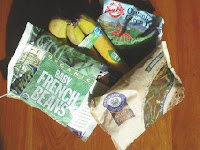 |
Buying organic produce makes so much sense: fewer fossil fuels are used in its production; growers, pickers, packers, and consumers are not exposed to toxic chemicals; nutritionists suggest organic diets help prevent cancer; and the biological balance of our insect world is less impacted. When organic produce is not readily available or price constraints force us to choose which organic products to buy, The Organic Buyer’s Guide (http://static.foodnews.org/pdf/EWG-shoppers-guide.pdf) is a valuable resource. It offers the “Dirty dozen”—produce that exposes us to the most pesticides, and the fifteen foods that contain the fewest pesticides. The full list of 49 products (rated from least to most pesticides) can be viewed at http://www.foodnews.org/fulllist.php. Buy These Organic Celery Peaches Strawberries Apples Blueberries Nectarines Bell Peppers Spinach Cherries Kale/Collard Greens Potatoes Grapes (Imported) Lowest in Pesticides Onions Avocado Sweet Corn Pineapple Mangos Sweet Peas Asparagus Kiwi Cabbage Eggplant Cantaloupe Watermelon Grapefruit Sweet Potato Honeydew Melon SmartMoney.com's Senior Consumer Reporter, Kelli Grant, gives advice on how to buy organic while staying within a budget. |
Search This Blog
2/14/2011
The Dirty Dozen - Organic Produce Buyer's Guide
Labels:
green shopping
Subscribe to:
Post Comments (Atom)

Great post!
ReplyDeletethank you carol, for empowering us with the awareness necessary for healthier living.
ReplyDelete